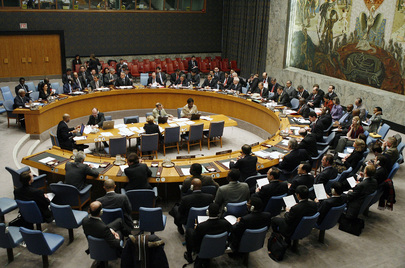UN Security Council warns of “external” intervention in S. Sudan conflict
January 10, 2014 (NEW YORK) – The members of the United Nations Security Council (UNSC) have strongly warned against “external” interventions that could exacerbate nearly a month of military and political tensions in South Sudan.

The world body does not, however, mention any country said to have intervened in the conflict, although fingers have been pointed at Ugandan troops allegedly fighting alongside government forces in a bid to defeat rebels loyal to South Sudan former vice-president, Riek Machar.
Uganda has, however, denied any military involvement in the conflict, saying its troops were only in South Sudan to protect Ugandans trapped in the violence.
Violence hit the world’s youngest nation mid-December last year following a misunderstanding among members of the presidential guards in the capital, Juba.
More than 1,000 people have died and nearly 200,000 displaced as the conflict later flared along ethnic lines in South Sudan’s states of Upper Nile, Jonglei and Unity.
Talks between the warring parties, under the mediation of regional leaders from the Inter-Governmental Authority on Development (IGAD), are currently ongoing in Ethiopia, with calls for peaceful dialogue through cessation of hostilities key in these talks.
“The members of the Security Council underlined their demand for President Salva Kiir, former Vice President Riek Machar and other political leaders to demonstrate leadership by immediately agreeing to a cessation of hostilities and commencing a broader dialogue as proposed in the mediation efforts underway by IGAD in Addis Ababa”, the statement reads.
In particular, the UNSC urged Machar to move forward and agree to a cessation of hostilities without precondition and requested President Kiir, to release all political leaders currently detained in order to “create an environment conducive to a successful dialogue”.
The South Sudanese president has, however, defied mounting international pressure on him to unconditionally release detainees arrested last month following an alleged coup attempt in the country.
Members of the UNSC also called on both parties in the conflict to allow humanitarian access to thousands displaced and further agitated for security of economic infrastructure, including oil installations and the safety of the employees.
UN CHIEF WELCOMES TALKS
The UN Secretary General on Friday welcomed the beginning of the IGAD-mediated talks on South Sudan crisis, saying there “must” be no further delays in agreeing on a cessation of hostilities.
“I called President Salva Kiir yesterday [Thursday] again and urged him to demonstrate leadership and political flexibility by immediately releasing political prisoners”, Ban Ki Moon said in a statement extended to Sudan Tribune.
“South Sudan is at a crossroads; this crisis can be resolved only at the negotiating table; and I urge the two sides to negotiate in earnest”, he added.
Western diplomats and the international community have all voiced their concerns for dialogue between South Sudan’s warring parties as a means to end nearly a month of violence in the East African country.
ACTIVIST BACKS UNSC MOVE
A South Sudanese civil society activist on Saturday welcomed the UNSC warning against any external intervention in the conflict, saying it was within the current expectations of citizens.
“South Sudanese want to see a quick end of the military confrontation and effective political dialogues going on. The more the end for fighting delays, the more criminal minded individuals take the opportunity for committing crimes”, said Edmund Yakani, the Executive Director for Community Empowerment for Progress Organisation (CEPO).
We urge each of the conflicting parties to compromise and demonstrate responsibility in order to pave way for a conductive atmosphere for peaceful dialogue, he stressed.
(ST)
